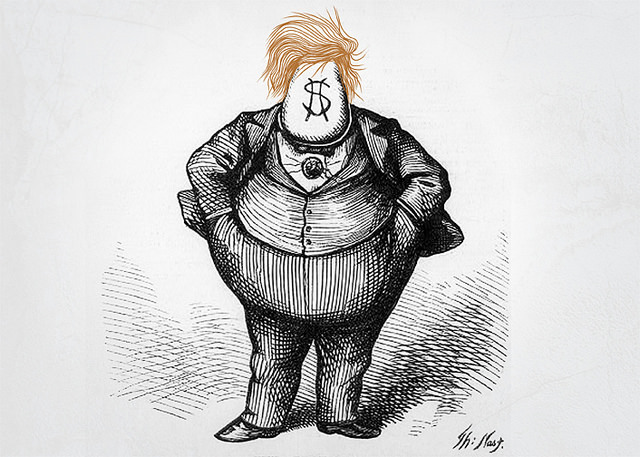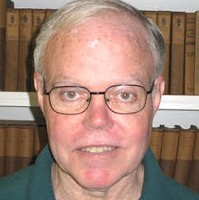
*Editor’s note: Disagree with this Op-Ed or opinion? We’re happy to share your experience here.
If you are offering a rebuttal, please say so in notes, and we will give it priority if it passes the smell test.
~
Extract from: The Essential Guide to Donald Trump (And Why I am Sailing to Nova Scotia if He Wins) by Kenneth McCallion.
~
Since Donald Trump has repeatedly characterized himself as the “Law and Order Candidate,” his close dealings with numerous mob figures and career criminals over the years bears particular scrutiny.
Organized crime is the antithesis of law and order. Organized criminals make their “living” every day by breaking the law, defrauding people out of their life savings, manipulating the stock market, using fear and terror tactics to extort money from businesses, selling drugs, promoting prostitution and preying upon gambling addicts. Anything to make a buck by appealing to our basest weaknesses and worst impulses. So why is Donald Trump so close to the mob?
Trump, of course, is not the first real estate developer and casino owner to have had ties with members of organized crime. Indeed, it comes as no great surprise that Donald Trump, as a real estate developer and as a casino owner, had dealings with the mob. However, as the Republican candidate for the Presidency of the United States, Trump’s ties with an organized crime should be scrutinized much more carefully to determine exactly what the nature of these relationships are and to what extent they continue today. Just as voters who are selecting their next City Council member, Mayor or Representative to Congress voters should know whether a candidate for that office is cozy with the mob, or in the pocket of organized crime, they should be aware whether a potential next President is mob-connected.
Why are past affiliations with organized crime reason for concern when an ex-casino owner is running for President of the United States? The reason for concern is that once a business person is close to the mob, it is virtually impossible to sever completely that relationship. Many have tried, but few have succeeded. Once the mob has its hooks into someone, and that person wants to make a clean break from it, there are only two options: The Witness Protection Program or the morgue. Believe me (to coin a phrase) I know.
I was a federal organized crime prosecutor for many years during the late 1970s and early 1980s, where I focused primarily on the mob-controlled unions, such as Teamster Local 282, that dealt with the construction trades working on New York job sites, including those relating to Trump’s construction projects. So I speak from a wealth of experience with business people and other individuals who became caught up in the dark web of violence, fraud, and deception that characterize virtually all mob relationships.
Other than his father, Donald Trump’s primary mentor and role model during his formidable years was the legendary (and infamous) mob lawyer, Roy Cohn. Cohn had been Chief Counsel to Senator Joseph McCarthy during what was referred to in the late 1950s as the McCarthy Hearings, where Senator McCarthy called before the Senate Hearing Committee dozens of government officials, labor leaders and Hollywood scriptwriters and producers who were suspected of being “card-carrying Communists” or Communist sympathizers. McCarthy, like Trump, temporary transfixed the American public with dark conspiracy theories and fear that Communists were infiltrating every corner of the country and posed a grave national threat. Sound familiar? Trump’s call for a ban on most if not all Muslims for fear that they will turn out to be terrorists seems like it was ripped from the pages of McCarthy’s playbook.
Senator McCarthy’s downfall finally came when he started accusing members of the U.S. military of communist leanings. The generals pushed back, with the famous public reprimand of U.S. Army attorney Joseph Nye Welch: “Until this moment, little did I dream that you could be so reckless and so cruel… Have you left no sense of decency!” [1]
Like the bully in the schoolyard, once McCarthy was exposed as having no sense of decency, he quickly imploded as the egotistical coward that he was, and America survived another crisis that threatened its democracy. No doubt America will survive Trumpism, just as it survived McCarthyism and countless other challenges, but each one of these national paroxysms of fear spread by homegrown demagogues leaves a trail of countless victims in its wake, people who are damaged and defamed in an instant with a reckless false comment. In many cases, these victims can never recover their reputations again. As the saying goes, “A lie can spread halfway around the world before the truth can get its boots on.”
The Roy Cohn who counseled Senator McCarthy was the same Roy Cohn who was young Donald Trump’s mentor as he grew his real estate business. After the McCarthy Hearings, Roy Cohn went into the private practice of law in New York and quickly earned a reputation as one of the top mob lawyers in the City, if not the country. Cohn operated out of a townhouse on East 68th Street in Manhattan, where clients Anthony “Fat Tony” Salerno and Paul “Big Paul” Castellano were regular visitors. Besides getting advice on their legal problems, as a former secretary later recalled to Wayne Barrett in his 1992 book, Trump: The Deals and the Downfall, [2] the visits by the mob Titans to their lawyer’s office allowed them to talk shop without having to worry about FBI bugs.
As reported by Pulitzer Prize-winning journalist Tom Robbins, Cohn told a reporter that Trump called him “fifteen to twenty times a day, asking what’s the status of this, what’s the status of that.” [3]
It has been fairly well documented that Roy Cohn introduced the young Donald Trump to many of the organized crime figures that became an important part of Trump’s life and career. It was also fairly well known, at least to law enforcement, that a real estate developer or casino operator who wanted to avoid any significant labor or union problems, or any problems with the construction trades, had to reach some accommodation with mob leaders. To do so, you had to have a go-between (often a lawyer) who could broker an understanding between the developer and the mob. Roy Cohn served Trump in this capacity. [4]
Trump got his start in Atlantic City with the purchase of a bar for $1 million, which was twice its market value from Salvatore Testa. Testa was a “made-man” in the Philadelphia mafia and son of Philip “Chicken Man” Testa, who was briefly head of the Philadelphia mob after the 1980 “rub out” of Angelo Bruno. Trump built Harrah’s Casino on the land, and then Trump bought out his partner, Harrah’s Entertainment, and renamed the casino “Trump Plaza.”
As Wayne Barrett further describes, Trump Plaza Casino and Hotel’s connections to the mob also included Nicademo “Little Nicky” Scarfo (who became boss after the elder Testa was blown up) and his nephew Phillip “Crazy Phil” Leonetti. Scarfo and Leonetti controlled two of the major construction and concrete companies in Atlantic City. Both companies, Scarf, Inc. and Nat Nat, worked on the building of Harrah’s, according to the State of New Jersey Commission of Investigation’s 1986 report on organized crime. Also, according to George Anastasia’s book, Blood and Honor, [5] Scarfo controlled the bartenders’ union, which represented Trump’s workers in Atlantic City.
One more link to organized crime lurks in Trump’s past Atlantic City dealings. He had a close association with Kenny Shapiro, an investment banker for Scarfo. According to secret recordings in 1983 of then-Scarfo attorney Robert F. Simone, Shapiro was intimately involved with bribing Atlantic City Mayor Michael J. Matthews, whose term would end in 1984 with a conviction on extortion charges.
Trump’s projects in New York also required him to deal with several known Mafia figures and their companies. In New York City, several of his buildings were built by S&A Concrete Co., a concern partly owned by Anthony “Fat Tony” Salerno, the boss of the Genovese crime family. In addition to this business relationship, Trump and Salerno were both represented by attorney Roy Cohn. In his book, Barrett cites an anonymous source who confirmed that on at least one occasion, Trump and Salerno had a “sit-down” in Cohn’s apartment. [6]
Given his close association with numerous mob figures, it is ironic that Trump, the self-touted law and order candidate, poses the greatest danger of any Presidential candidate in history that organized crime figures will have direct access to the White House if he is elected.
~
Sources:
[1] “Joseph McCarthy “Debate with Welch During Senate Trials” Transcript.”Joseph McCarthy “Debate with Welch During Senate Trials” Transcript. Speeches-USA, n.d.
[2] Barrett, Wayne. Trump: The Deals and the Downfall. New York, NY: HarperCollins, 1992. Print
[3] Robbins, Tom. “Trump and the Mob.”The Marshall Project. The Marshall Project, 27 Apr. 2016.
[4] For more on Trump and Roy Cohen see Mahler, Jonathan, and Matt Flegenheimer. “What Donald Trump Learned From Joseph McCarthy’s Right-Hand Man.” The New York Times, 20 June 2016; Krause, Michael. “Roy Cohn: Joe McCarthy’s Henchman and Donald Trump’s Mentor.”POLITICO Magazine, 8 Apr. 2016; O’Harrow, Robert, Jr., and Shawn Boburg. “The Man Who Showed Donald Trump How to Exploit Power and Instill Fear.” Washington Post, 17 June 2016.
[5] Anastasia, George.Blood and Honor: Inside the Scarfo Mob, the Mafia’s Most Violent Family. New York: W. Morrow, 1991. Print.
[6] Barrett, Wayne. Trump: The Deals and the Downfall. New York, NY: HarperCollins, 1992. Print.
~
Author: Kenneth F. McCallion
Image: DonkeyHotey/ Flickr
Editor: Khara-Jade Warren






Read 0 comments and reply